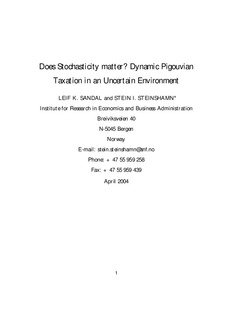| dc.contributor.author | Sandal, Leif Kristoffer | |
| dc.contributor.author | Steinshamn, Stein Ivar | |
| dc.date.accessioned | 2006-07-11T11:39:58Z | |
| dc.date.available | 2006-07-11T11:39:58Z | |
| dc.date.issued | 2004-04 | |
| dc.identifier.issn | 1500-4066 | |
| dc.identifier.uri | http://hdl.handle.net/11250/164069 | |
| dc.description.abstract | The effects of discounting, stochasticity, non-linearities and maximum decay upon an optimal corrective tax are analyzed using stochastic dynamic optimization. Optimal corrective taxes are derived as explicit feedback control laws in the presence of both flow and stock externalities when the decay of aggregated pollution is subject to a general stochastic process. This represents an adaptive approach to regulation of the environment. The problem has been solved using a non-linear Hamilton-Jacobi-Bellman equation. The model applied is quite general in the state variable, accumulated pollution, and in the control variable, production. The objective function is to maximize expected social welfare defined as the sum of consumers’ and producers’ surplus adjusted for externalities. Social welfare is not assumed to be separable in production and accumulated pollution. The main result is that the optimal tax is more sensitive to discounting and non-linearities than to stochasticity. | en |
| dc.format.extent | 193191 bytes | |
| dc.format.mimetype | application/pdf | |
| dc.language.iso | eng | en |
| dc.publisher | Norwegian School of Economics and Business Administration. Department of Finance and Management Science | en |
| dc.relation.ispartofseries | Discussion paper | en |
| dc.relation.ispartofseries | 2004:6 | en |
| dc.subject | global warming | en |
| dc.subject | dynamic corrective taxes | en |
| dc.subject | stochastic dynamic optimisation | en |
| dc.title | Does stochasticity matter? : dynamic pigouvian taxation in an uncertain environment | en |
| dc.type | Working paper | en |
